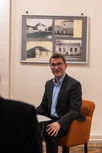
Lecture
On January 29, within the scientific segment of the festival's current edition, Rossi Fest proudly hosted a musicologist from the Academy of Music in Zagreb, Ivan Ćurković, at the National Theater Museum. The distinguished guest delved into the captivating theme of "War and Peace in G. F. Handel's oratorios," captivating the audience with his insights and expertise.

Dr. sc. Ivan Ćurković was born in Novi Sad in 1980. He graduated from the University of Zagreb in musicology at the Academy of Music (2005) and comparative literature and Hungarian studies at the Faculty of Philosophy (2007). He is pursuing his doctoral studies at the Institute of Musicology of the Faculty of Philosophy of the University of Heidelberg, where he obtained the title of Doctor of Science in 2017 with a dissertation titled The Vocal Duet and G. F. Handel's Italian Contemporaries. An Attempt at a Comparison. Since 2007, he has been employed at the Department of Musicology of the Academy of Music, University of Zagreb, since 2023 as an associate professor. In the period 2018-2021, he held the position of head of the Department of Musicology.
He is a participant in several scientific conferences in the country and abroad, and he was also the president of the program and organizational committee of the international scientific conference Musicology and Its Future in Times of Crises organized on the occasion of the 50th anniversary of the founding of the Department of Musicology of the Academy of Music in 2020, and a member of the organizational committee of the scientific conference The Blasphemous in Music in Sound held at the Department of Musicology in 2023. He is the author of the monograph The Vocal Duets of G. F. Handel and His Italian Contemporaries (1706-1724), several scientific and professional articles as well as music and theater criticism, and he also works as a part-time associate of the Lexicographic Institute Miroslav Krleža. Since 2022, he has been a member of the management board of the international networking project, the so-called COST Action A new ecosystem of early music studies financed by the European Cooperation in Science and Technology.
His areas of scientific interest are vocal music of the 18th century with special emphasis on the work of G. F. Händel, performance practice of the past and present, and the application of various cultural theories in historical musicology.
War and peace in the oratorios of G. F. Handel
January 30, 2024, at 6 p.m., Jewish Culture Center
Abstract:
Although the war theme is an integral part of the opera librettos set to music by G. F. Händel, with frequent dynastic struggles characteristic of the opera series of that time, only the composer's vocal music in the English language could fully correspond with the wartime - or peaceful - reality of the United Kingdom. The English oratorio genre was invented primarily to morally educate the audience, and many authors such as Ruth Smith have pointed out the importance of interpreting these Handel works in the context of the time of their creation and the intellectual climate that surrounded them. At the same time, the reception of biblical oratories tended to identify the British nation with the chosen people, since the Old Testament war conflicts and their resolution could be seen in their own political everyday life.
The lecture will consider those Handel oratorios in which the theme of war and peace plays a more important role and find a balance between the meanings they could have taken on at the time of their creation to their relevance today. Most of the presentation will focus on case studies from two groups of oratorios. The first includes works such as Deborah, Belshazzar, and, to a certain extent, Alexander Balus, which thematize the events of the war with the procedures of classical dramaturgy in which the conflict arises from the conflict between the warring parties, while the musical face takes on individual soloist roles, as well as choral parts of the opposing parties ( ethnic) groups. Judas Maccabaeus and Joshua are primarily in the second group, and the "enemy" in the musical and dramaturgical sense does not appear in them at all. Together with them, we should also consider Solomon, one of the rare oratorical thematizations of political stability and peace.















